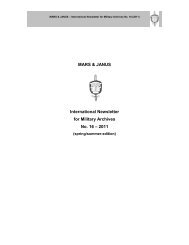National Experiences - British Commission for Military History
National Experiences - British Commission for Military History
National Experiences - British Commission for Military History
You also want an ePaper? Increase the reach of your titles
YUMPU automatically turns print PDFs into web optimized ePapers that Google loves.
tH e pl a C e o f do u H e t: a reassessment 119<br />
It is a fact that there were a great many similarities in what the three great interwar<br />
proponents of air power - Douhet, Trenchard, Mitchell - believed and advocated<br />
(there were also some differences of course). This was no doubt partly due to their<br />
ideas being the natural products of like stimuli. As Higham says, men subjected<br />
to similar influences sometimes arrive at similar conclusions, without necessarily<br />
being aware of each other’s ideas. But there was as well, undeniably, considerable<br />
cross-fertilisation, as Brodie says. For, it is clear that, from the earliest days, airmen<br />
constituted a close international community; the French, Italian, American and <strong>British</strong><br />
members of which were brought even closer together by WWI. And even in the<br />
earliest days of aviation, there were opportunities <strong>for</strong> airmen from different countries<br />
to meet each other and to exchange in<strong>for</strong>mation and ideas; as regards <strong>British</strong>, French,<br />
Italian and US aviation, such opportunities were naturally very much greater during<br />
the war.<br />
As Boone Atkinson has written, military men are sometimes reluctant to acknowledge<br />
debts - least of all to a country which had suffered the debacle of Caporetto.<br />
There was, it is clear, a conscious downplaying of Caproni’s influence on US airmen<br />
after the fact. No doubt national pride played a large part in this; as did professional<br />
pride (Caproni being a civilian). But, of course, unlike the Americans, the <strong>British</strong> had<br />
had considerable experience of strategic bombing during WWI - both as practitioners<br />
and as victims. As a consequence, the <strong>British</strong> were undoubtedly less receptive to<br />
outside influences than the Americans. Nevertheless, the evidence presented above<br />
strongly suggests, in my judgement, that <strong>British</strong> airmen were not only interested in<br />
and in<strong>for</strong>med about, but also influenced by, Italian aviation and aviation developments<br />
in Italy - directly challenging the prevailing view. I do not of course seek<br />
to deny the deep native roots of <strong>British</strong> air power theory - HG Wells, Sykes, Lord<br />
Montagu, Lanchester, Sueter, Spaight “et al”. But I certainly do not think that it is<br />
unreasonable to argue that <strong>British</strong> airpower theory could have been a compound of<br />
indigenous factors and outside influences.<br />
I am not claiming that knowledge of (still less, interest in) the ideas of Douhet<br />
permeated all levels of the RAF: in all organisations there is a division between<br />
those who make and those who implement policy and their agendas can be very<br />
different. I do claim however that certain individuals, occupying positions of power<br />
or influence, were certainly aware of - and probably influenced by - Douhet. Knowledge<br />
and influence are of course different things. Knowledge, although an essential<br />
prerequisite <strong>for</strong> influence, does not automatically lead to influence. I readily admit<br />
that to date more hard evidence of knowledge has been accumulated than of influence.<br />
The evidence of influence is in truth largely circumstantial. However, I find the<br />
evidence of influence, albeit largely circumstantial, persuasive. It is hard to accept<br />
that the RAF’s awareness of Douhet’s ideas - as demonstrated in this piece - and the<br />
RAF’s passionate belief in strategic bombing between the wars were completely<br />
unconnected.<br />
Those who will no doubt retort (quite rightly) that over the years the RAF has in



